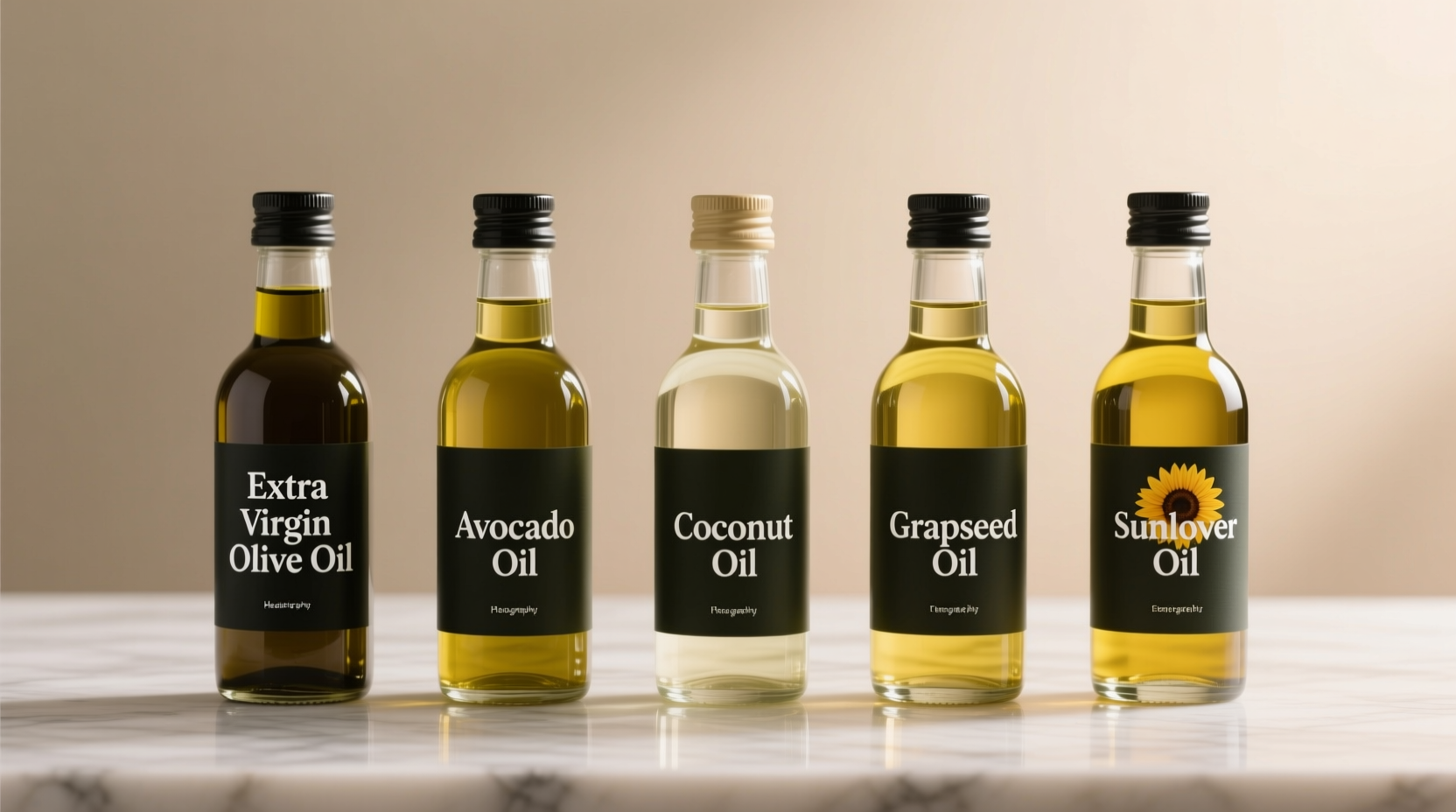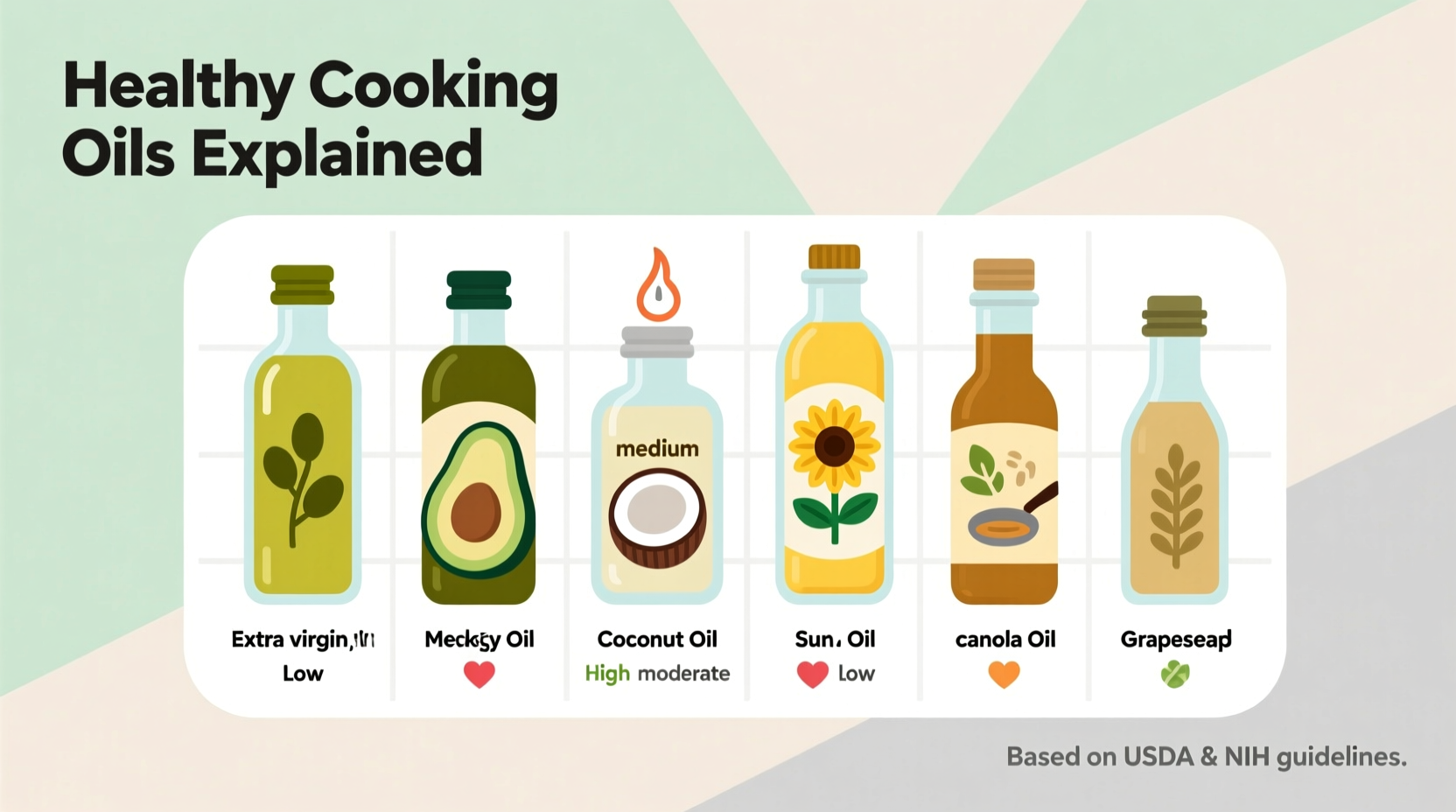Extra virgin olive oil and avocado oil are the healthiest options for most cooking applications, with avocado oil being superior for high-heat methods due to its higher smoke point (520°F/270°C) while maintaining a favorable monounsaturated fat profile. For low to medium-heat cooking and dressings, extra virgin olive oil provides exceptional heart health benefits and antioxidant properties.
Choosing the right cooking oil isn't just about flavor—it directly impacts your cardiovascular health, inflammation levels, and long-term wellness. With conflicting information flooding the internet, this guide cuts through the noise with evidence-based recommendations from nutrition science and culinary chemistry. You'll discover exactly which oils deliver optimal health benefits for different cooking methods, why some "healthy" oils become harmful when heated, and how to make informed choices that align with both your health goals and cooking needs.
Understanding Cooking Oil Fundamentals
Before selecting your ideal cooking oil, you need to understand three critical factors that determine both health impact and cooking performance. These aren't marketing gimmicks—they're biochemical realities that affect how oils behave in your body and in your pan.
Smoke Point Science: Why Temperature Matters
When oil reaches its smoke point, it begins breaking down chemically, releasing harmful compounds called aldehydes and free radicals. These substances contribute to inflammation and have been linked to increased risk of heart disease and cancer. The smoke point isn't fixed—it varies based on refinement level and freshness. As Harvard T.H. Chan School of Public Health researchers explain, heating oils beyond their smoke points creates toxic compounds that negate any health benefits.
Fatty Acid Composition: The Heart Health Connection
The balance of saturated, monounsaturated, and polyunsaturated fats determines an oil's health profile. Monounsaturated fats (like oleic acid in olive oil) support heart health by improving cholesterol levels. Polyunsaturated fats contain essential omega-3 and omega-6 fatty acids, but excessive omega-6 can promote inflammation when not balanced with omega-3s. Saturated fats remain controversial, with recent research suggesting context matters—coconut oil's medium-chain triglycerides behave differently than animal-based saturated fats.
| Cooking Oil | Smoke Point (°F) | Saturated Fat | Monounsaturated Fat | Polyunsaturated Fat | Best Cooking Applications |
|---|---|---|---|---|---|
| Extra Virgin Olive Oil | 320-375 | 14% | 73% | 11% | Low-heat cooking, dressings, finishing |
| Avocado Oil | 520 | 12% | 70% | 13% | High-heat searing, grilling, roasting |
| Refined Coconut Oil | 450 | 90% | 6% | 2% | Moderate-heat cooking, baking |
| High-Oleic Sunflower Oil | 450 | 10% | 80% | 5% | Medium to high-heat cooking |
| Canola Oil | 400 | 7% | 63% | 28% | Medium-heat cooking, baking |
Top Healthy Cooking Oils Compared
Extra Virgin Olive Oil: The Mediterranean Gold Standard
Backed by decades of research from the PREDIMED study, extra virgin olive oil (EVOO) remains the gold standard for heart-healthy fats. Unlike refined olive oils, EVOO retains polyphenols like oleocanthal that provide anti-inflammatory benefits comparable to ibuprofen. The American Heart Association recommends EVOO as part of a Mediterranean diet pattern, which reduces cardiovascular events by 30%. Choose dark glass bottles and use within 18 months for maximum benefits.
Avocado Oil: The High-Heat Champion
Avocado oil's remarkable stability at high temperatures makes it ideal for searing, grilling, and roasting. Its fatty acid profile closely mirrors olive oil's heart-healthy composition but with nearly double the smoke point. Research published in the Journal of Agricultural and Food Chemistry confirms avocado oil maintains its beneficial compounds even when heated to 400°F for extended periods. Look for cold-pressed, unrefined varieties to maximize nutrient retention.
Coconut Oil: Context-Specific Benefits
Despite controversy, coconut oil has legitimate uses when understood properly. Its medium-chain triglycerides (MCTs) are metabolized differently than other saturated fats, potentially offering quick energy without impacting cholesterol like long-chain fats. However, the American Heart Association cautions against regular high-heat cooking with coconut oil due to its high saturated fat content (90%). Use refined coconut oil for baking or moderate-heat cooking where its flavor complements dishes, but don't rely on it as your primary cooking fat.

Matching Oils to Your Cooking Methods
Low-Heat Cooking & Raw Applications (Under 300°F)
For salad dressings, dips, and low-temperature sautéing, extra virgin olive oil shines. Its delicate flavor compounds and antioxidants remain intact below 300°F. The polyphenols in high-quality EVOO actually increase bioavailability of nutrients in vegetables—a phenomenon documented in studies from the University of California, Davis. Save your best, fruitiest EVOO for finishing dishes where its complex flavors can be appreciated.
Medium-Heat Cooking (300-400°F)
For everyday sautéing, stir-frying, and baking, high-oleic sunflower oil or refined avocado oil provides excellent stability. These oils maintain their health benefits while withstanding typical stovetop temperatures. Canola oil remains a viable budget-friendly option when choosing non-GMO, expeller-pressed varieties, though its higher omega-6 content means it shouldn't dominate your fat intake.
High-Heat Cooking (Above 400°F)
When searing steaks, roasting at high temperatures, or deep-frying, refined avocado oil is your healthiest choice. Its exceptional heat stability prevents the formation of harmful compounds that occur with more delicate oils. Contrary to popular belief, extra virgin olive oil shouldn't be used for high-heat applications—its lower smoke point and valuable compounds degrade quickly above 375°F. The Academy of Nutrition and Dietetics confirms that avocado oil maintains its nutritional integrity better than alternatives at high temperatures.
Common Cooking Oil Misconceptions
"All Saturated Fats Are Equally Harmful" Myth
Recent research shows not all saturated fats behave the same. The medium-chain triglycerides (MCTs) in coconut oil are metabolized differently than the long-chain saturated fats in butter or lard. However, this doesn't make coconut oil universally "healthy"—context matters. For high-heat cooking, the stability of monounsaturated fats in avocado oil provides better overall health outcomes than relying on coconut oil's MCTs.
The "Smoke Point Is Fixed" Misunderstanding
Many online smoke point charts present fixed numbers, but reality is more nuanced. Freshness, refinement level, and even the pan material affect when oil begins to smoke. A high-quality extra virgin olive oil might smoke at 375°F when fresh but drop to 320°F after three months of improper storage. Always watch for the first wisps of smoke rather than relying solely on temperature numbers.
Making Your Personalized Oil Selection
Your ideal cooking oil depends on three factors: your cooking methods, health goals, and taste preferences. For most home kitchens, maintaining two oils covers 90% of needs: a high-quality extra virgin olive oil for dressings and low-heat cooking, plus avocado oil for higher-temperature applications. This combination delivers optimal heart health benefits while accommodating diverse cooking techniques.
Consider sustainability when selecting oils—avocado oil production has significant water usage concerns, while olive oil has a lower environmental impact when sourced from traditional groves. Store all oils in dark glass containers away from heat and light to prevent oxidation, which creates harmful compounds even before heating.











 浙公网安备
33010002000092号
浙公网安备
33010002000092号 浙B2-20120091-4
浙B2-20120091-4